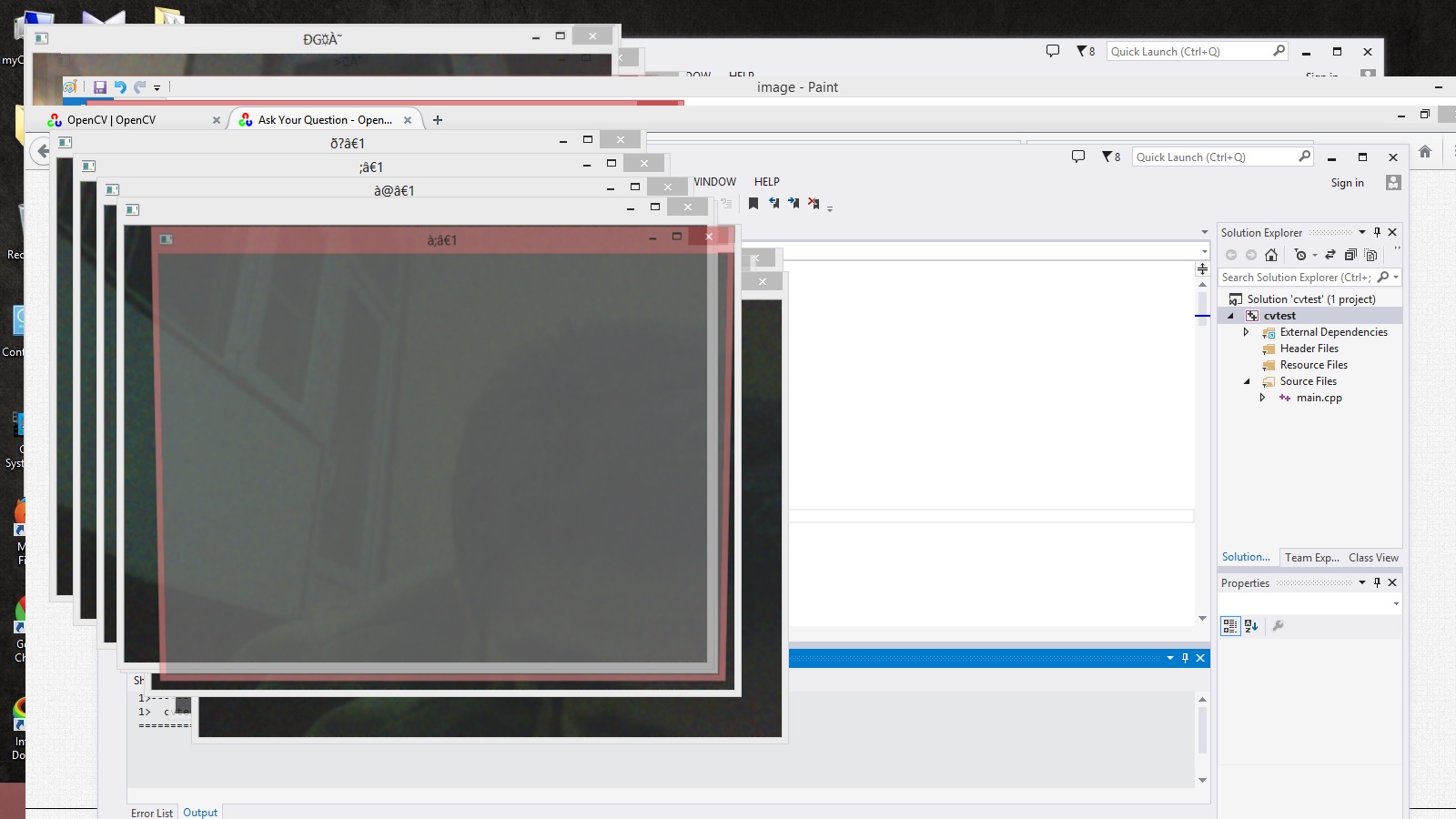when i debug the code it show many camera image laptop any body know what is the problem!!!??

here is the code:
#include <opencv\cv.h>
#include <opencv\highgui.h>
using namespace std;
using namespace cv;
//our sensitivity value to be used in the threshold() function
const static int SENSITIVITY_VALUE = 20;
//size of blur used to smooth the image to remove possible noise and
//increase the size of the object we are trying to track. (Much like dilate and erode)
const static int BLUR_SIZE = 10;
//we'll have just one object to search for
//and keep track of its position.
int theObject[2] = {0,0};
//bounding rectangle of the object, we will use the center of this as its position.
Rect objectBoundingRectangle = Rect(0,0,0,0);
//int to string helper function
string intToString(int number){
//this function has a number input and string output
std::stringstream ss;
ss << number;
return ss.str();
}
void searchForMovement(Mat thresholdImage, Mat &cameraFeed){
//notice how we use the '&' operator for the cameraFeed. This is because we wish
//to take the values passed into the function and manipulate them, rather than just working with a copy.
//eg. we draw to the cameraFeed in this function which is then displayed in the main() function.
bool objectDetected=false;
Mat temp;
thresholdImage.copyTo(temp);
//these two vectors needed for output of findContours
vector< vector<Point> > contours;
vector<Vec4i> hierarchy;
//find contours of filtered image using openCV findContours function
//findContours(temp,contours,hierarchy,CV_RETR_CCOMP,CV_CHAIN_APPROX_SIMPLE );// retrieves all contours
findContours(temp,contours,hierarchy,CV_RETR_EXTERNAL,CV_CHAIN_APPROX_SIMPLE );// retrieves external contours
//if contours vector is not empty, we have found some objects
if(contours.size()>0)objectDetected=true;
else objectDetected = false;
if(objectDetected){
//the largest contour is found at the end of the contours vector
//we will simply assume that the biggest contour is the object we are looking for.
vector< vector<Point> > largestContourVec;
largestContourVec.push_back(contours.at(contours.size()-1));
//make a bounding rectangle around the largest contour then find its centroid
//this will be the object's final estimated position.
objectBoundingRectangle = boundingRect(largestContourVec.at(0));
int xpos = objectBoundingRectangle.x+objectBoundingRectangle.width/2;
int ypos = objectBoundingRectangle.y+objectBoundingRectangle.height/2;
//update the objects positions by changing the 'theObject' array values
theObject[0] = xpos , theObject[1] = ypos;
}
//make some temp x and y variables so we dont have to type out so much
int x = theObject[0];
int y = theObject[1];
//draw some crosshairs on the object
circle(cameraFeed,Point(x,y),20,Scalar(0,255,0),2);
line(cameraFeed,Point(x,y),Point(x,y-25),Scalar(0,255,0),2);
line(cameraFeed,Point(x,y),Point(x,y+25),Scalar(0,255,0),2);
line(cameraFeed,Point(x,y),Point(x-25,y),Scalar(0,255,0),2);
line(cameraFeed,Point(x,y),Point(x+25,y),Scalar(0,255,0),2);
putText(cameraFeed,"Tracking object at (" + intToString(x)+","+intToString(y)+")",Point(x,y),1,1,Scalar(255,0,0),2);
}
int main(){
//some boolean variables for added functionality
bool objectDetected = false;
//these two can be toggled by pressing 'd' or 't'
bool debugMode = false;
bool trackingEnabled = false;
//pause and resume code
bool pause = false;
//set up the matrices that we will need
//the two frames we will be comparing
Mat frame1,frame2;
//their grayscale images (needed for absdiff() function)
Mat grayImage1,grayImage2;
//resulting difference image
Mat differenceImage;
//thresholded difference image (for use in findContours() function)
Mat thresholdImage;
//video capture object.
VideoCapture capture;
capture.open(0);
if(!capture.isOpened()){
cout<<"ERROR ACQUIRING VIDEO FEED\n";
getchar();
return -1;
}
while(1){
//we can loop the video by re-opening the capture every time the video reaches its last frame
//check if the video has reach its last frame.
//we add '-1' because we are reading two frames from the video at a time.
//if this is not included, we get a memory error!
//read first frame
capture.read(frame1);
//convert frame1 to gray scale for frame differencing
cv::cvtColor(frame1,grayImage1,COLOR_BGR2GRAY);
//copy second frame
capture.read(frame2);
//convert frame2 to gray scale for frame differencing
cv::cvtColor(frame2,grayImage2,COLOR_BGR2GRAY);
//perform frame differencing with the sequential images. This will output an "intensity image"
//do not confuse this with a threshold image, we will need to perform thresholding afterwards.
cv::absdiff(grayImage1,grayImage2,differenceImage);
//threshold intensity image at a given sensitivity value
cv::threshold(differenceImage,thresholdImage,SENSITIVITY_VALUE,255,THRESH_BINARY);
if(debugMode==true){
//show the difference image and threshold image
cv::imshow("Difference Image",differenceImage);
cv::imshow("Threshold Image",thresholdImage);
}else{
//if not in debug mode, destroy the windows so we don't see them anymore
cv::destroyWindow("Difference Image");
cv::destroyWindow("Threshold Image");
}
//use blur() to smooth the image, remove possible noise and
cv::blur(thresholdImage,thresholdImage,cv::Size(BLUR_SIZE,BLUR_SIZE));
//increase the size of the object we are trying to track. (Much like dilate and erode)
//threshold again to obtain binary image from blur output
cv::threshold(thresholdImage,thresholdImage,SENSITIVITY_VALUE,255,THRESH_BINARY);
if(debugMode==true){
//show the threshold image after it's been "blurred"
imshow("Final Threshold Image",thresholdImage);
}
else {
//if not in debug mode, destroy the windows so we don't see them anymore
cv::destroyWindow("Final Threshold Image");
}
//if tracking enabled, search for contours in our thresholded image
if(trackingEnabled){
searchForMovement(thresholdImage,frame1);
}
//show our captured frame
imshow("Frame1",frame1);
//check to see if a button has been pressed.
//this 10ms delay is necessary for proper operation of this program
//if removed, frames will not have enough time to referesh and a blank
//image will appear.
switch(waitKey(10)){
case 27: //'esc' key has been pressed, exit program.
return 0;
case 116: //'t' has been pressed. this will toggle tracking
trackingEnabled = !trackingEnabled;
if(trackingEnabled == false) cout<<"Tracking disabled."<<endl;
else cout<<"Tracking enabled."<<endl;
break;
case 100: //'d' has been pressed. this will debug mode
debugMode = !debugMode;
if(debugMode == false) cout<<"Debug mode disabled."<<endl;
else cout<<"Debug mode enabled."<<endl;
break;
case 112: //'p' has been pressed. this will pause/resume the code.
pause = !pause;
if(pause == true){ cout<<"Code paused, press 'p' again to resume"<<endl;
while (pause == true){
//stay in this loop until
switch (waitKey()){
//a switch statement inside a switch statement? Mind blown.
case 112:
//change pause back to false
pause = false;
break;
}
}
}
else cout<<"Code resumed."<<endl;
break;
}
}
return 0;
}

